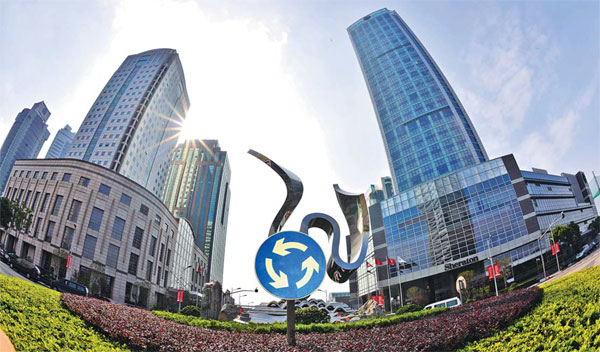Small site provides big lessons

Major measures such as negative list will be extended to suitable areas
The country will draw practical lessons from the development of the China (Shanghai) Pilot Free Trade Zone to reduce limits on foreign capital in services and manufacturing, senior government officials say.
Hu Zucai, deputy director of the National Development and Reform Commission, says that such practices as the negative list system and easier market access for foreign companies will be formalized and extended to suitable areas of China.
| More than 1,600 foreign companies have been established in the Shanghai free trade zone. Provided to China Daily |
"The government will continue to open the markets for financial services, education, culture and healthcare for foreign capital to invest in China, and dismantle policy barriers involving nurseries, elderly care, architectural design, auditing, logistics, e-commerce and other service businesses, as well as opening up the general manufacturing industry."
When it comes to approving foreign investment, China has long applied approval procedures that emphasize economic security and the public interest, while also considering market access and capital account management.
By the end of August, 1,612 foreign companies had been established in the Shanghai FTZ, which has adopted a system of general registration for foreign investment instead of the traditional approval mechanism.
About 91 percent of those companies obtained their business licenses through the new system.
Wang Shouwen, assistant minister of commerce, says the negative list has made it easier for foreign companies to enter the market, because businesses that are not on the list do not have to go through normal approval processes.
The negative list system is aimed at investment liberalization, trade facilitation, financial internationalization and the establishment of a clearer legal framework for administration.
To broaden market access and improve transparency for foreign companies, the 2014 negative list reduced the number of banned items from 196 to 139.
"As the negative list represents a new and internationally accepted model for the administration of foreign investment, China will improve its supervision in the whole investment and operation process to prevent potential risk and maintain a healthy market order within the FTZ," Wang says.
The ministry is expanding a program that gives local government a bigger role in dealing with more foreign companies to accelerate approval procedures in the FTZ. That system has been promoted at the national level to boost foreign investment and exports.
"Apart from trading companies, the proportion of service and manufacturing businesses has risen fast within the zone," says Yu Guangzhou, head of the General Administration of Customs.
Yu says the zone's growing headquarters economy, cross-border e-commerce, global equipment maintenance service, financial leasing and cultural industry are driving economic growth in the Yangtze River Delta.
Total trade in the zone was 500 billion yuan ($81.7 billion) between January and August, customs figures show.
zhongnan@chinadaily.com.cn
(China Daily European Weekly 10/03/2014 page23)
Today's Top News
- Stable trade ties benefit China, US
- New engine powers cargo drone expansion
- China to boost intl cooperation on green tech
- Factory activity sees marginal improvement in November
- Venezuela slams US' 'colonial threat' on its airspace
- Xi: Strengthen cyberspace governance framework































